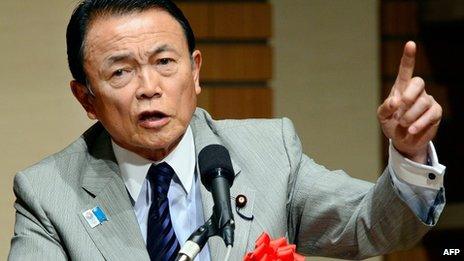Japan Deputy PM Taro Aso retracts Nazi comments
- Published

Japan's Deputy Prime Minister Taro Aso has retracted remarks suggesting that the country could learn from Nazi Germany's constitutional reform.
Mr Aso said on Monday Japan could "learn the technique" Nazi Germany used to change the Weimar constitution.
The remarks come amid debate in Japan over its pacifist constitution, which restricts the military to a self-defence role.
Mr Aso's comments drew criticism from neighbouring China and South Korea.
"I retract my remarks in which I cited the Nazis as an example, as it has ended up leading to misunderstanding," Mr Aso, who is also finance minister and a former prime minister, told reporters on Thursday.
"It is clear from all my remarks that I have an extremely negative view of the events involving the Nazis and the Weimar constitution."
Chief Cabinet Secretary Yoshihide Suga told reporters: "I want to make it clear that the... cabinet will never view the Nazi government positively".
'Nazi tactics'
On Monday, Mr Aso had said in a speech that: "The German Weimar constitution changed, without being noticed, to the Nazi German constitution. Why don't we learn from their tactics?"
In 1933 after a fire burned down the German parliament, Adolf Hitler, who was chancellor at the time, and President Paul von Hindenburg enforced a state of emergency, suspending civic freedoms guaranteed by the constitution.
Hitler then successfully passed the Enabling Act, which meant he could pass laws without consulting parliament - a move viewed as crucial to consolidating his grip on power.
Retracting the remarks on Thursday, Mr Aso said he highlighted the case "as a bad example of changes made without a substantial debate or understanding by the citizens".
Chinese Foreign Ministry spokesman Hong Lei said Mr Aso's comments had alarmed Japan's neighbours.
"We demand the Japanese side reflect on its history, fulfil its commitments on historical issues and win the trust of Asian neighbours and the international community through concrete actions," he said.
South Korean Foreign Ministry spokesman Cho Tai-young said the "remarks definitely hurt many people".
"It is clear what such comments on the [Nazi] regime mean to people of the time and to those who [suffered] from Japan's imperialistic invasion", he said.
'Expand and deepen'
Constitutional reform is a delicate issue in Japan. Under Article 9 of its post-war constitution, Japan is blocked from the use of force to resolve conflicts except in the case of self-defence.
Prime Minister Shinzo Abe, whose party now controls both houses of parliament, has indicated he wants to re-examine the role of Japan's military to meet the changing security environment in the Asia-Pacific region.
Mr Abe has said he wants to "expand and deepen" debate over the constitution in order to ease tight restrictions on the armed forces.
China and South Korea are opposed to the idea of Japan reforming its constitution in such a way.
Mr Aso has made verbal gaffes in the past.
During his term as prime minister, he accused doctors of lacking common sense and called the elderly a "feeble" group, despite his party relying heavily on older voters to keep it in power.
In May, Osaka's Mayor Toru Hashimoto came under fire after he said that the women who were forced to become prostitutes for Japan's WWII troops were "necessary".
- Published26 July 2013
- Published22 July 2013
- Published5 July 2011